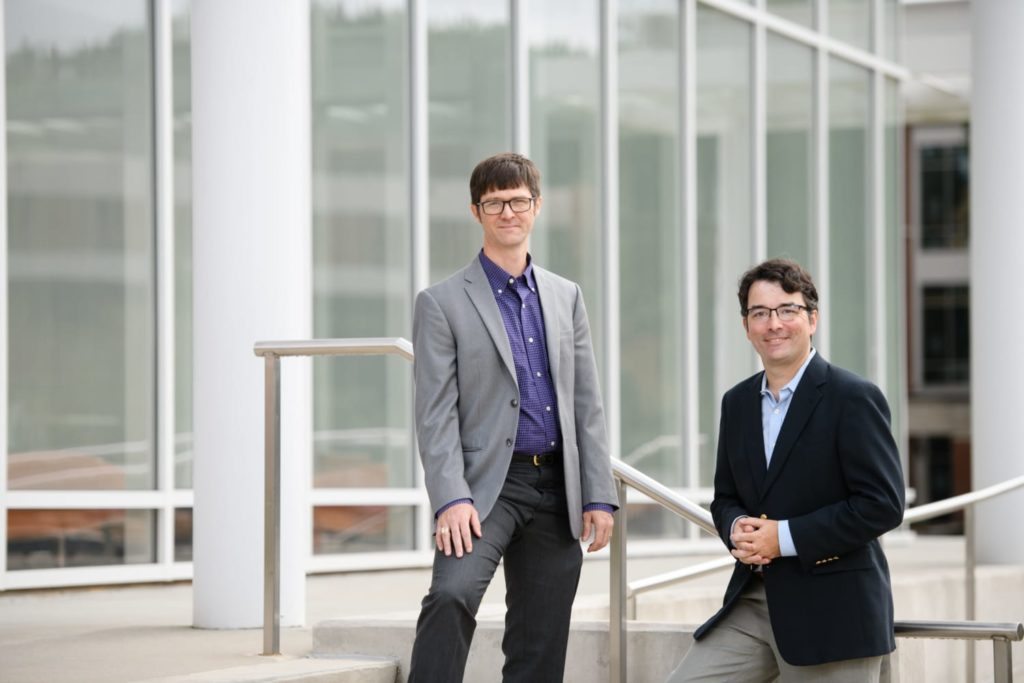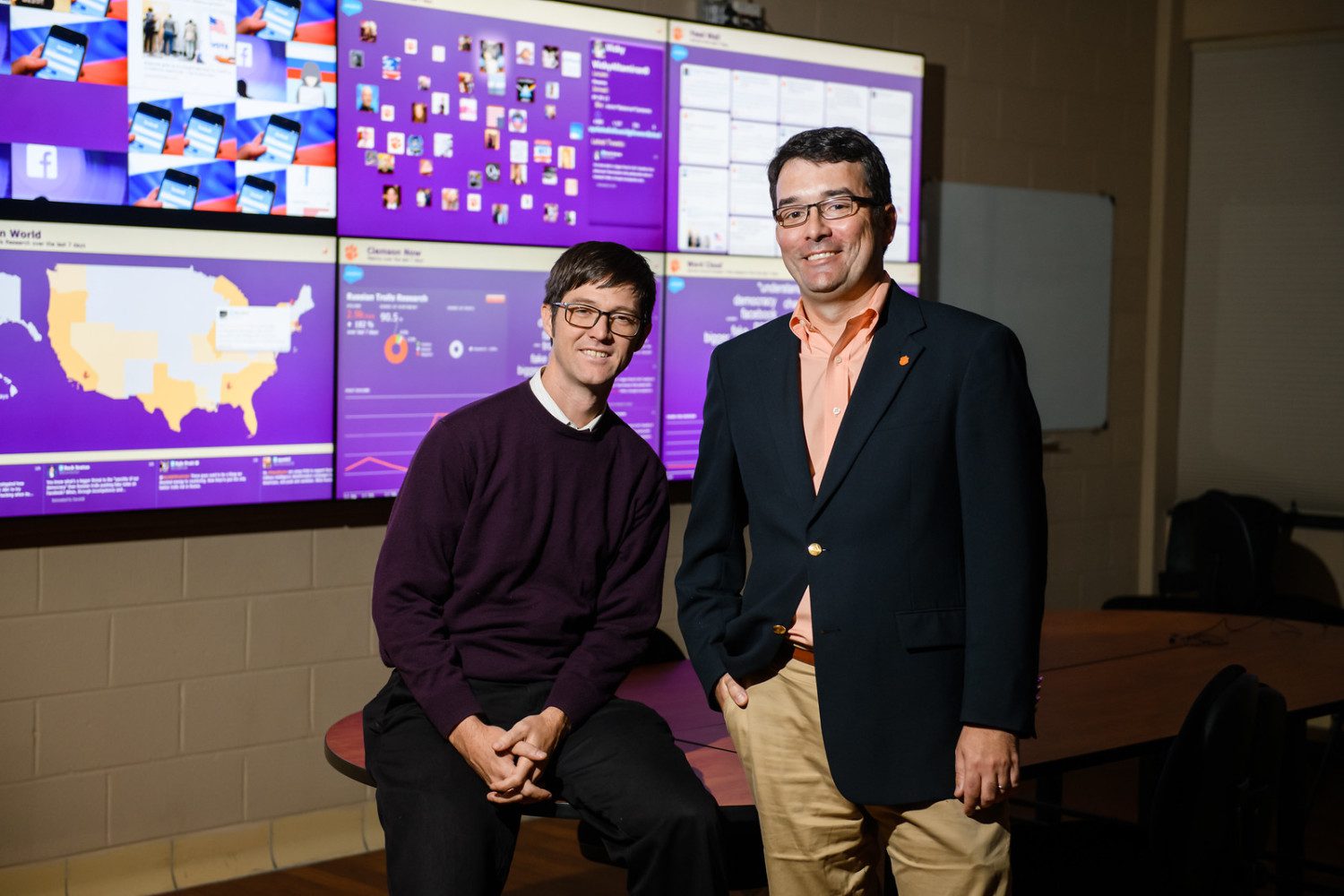Faculty from the Clemson University College of Behavioral, Social and Health Sciences and College of Business are part of a multidisciplinary team of researchers developing digital literacy tools to help curb the negative effects of online disinformation.
Darren Linvill, associate professor in the Department of Communication, and Patrick Warren, associate professor in the Department of Economics, join a team of researchers led by Siwei Lyu, Empire Innovation Professor of Computer Science and Engineering at the University of Buffalo. They have received a $750,000 grant from the National Science Foundation’s Convergence Accelerator, a program that builds upon basic research and discovery to accelerate solutions toward societal impact.
Linvill and Warren will aid in the creation of content and lessons that help all audiences identify online disinformation. While others on the research team will focus on delivering the content to younger audiences, Linvill and Warren will spearhead its delivery to an older audience once the tools are ready to be disseminated. He said the data concerning online disinformation clearly shows that both groups are equally important and should be addressed in different ways.
“Even many experts who study disinformation haven’t internalized the fact that older Americans spread disinformation seven or eight times more often than younger Americans,” Linvill said. “Essentially, my students’ grandparents need these tools more than my students do.”

The research team includes experts in artificial intelligence, the humanities, information science and other fields. In addition to the University of Buffalo and Clemson, they hail from the University of Illinois Urbana-Champaign, Lehigh University and Northeastern University.
The project — titled Disinformation Range to Improve User Awareness and Resilience to Online Disinformation — centers on developing a suite of digital literacy tools and advanced educational techniques to reduce the harmful effects of online disinformation. Researchers plan to have a prototype ready in June, when they will share it with senior citizens and teenagers.
“Just as a vaccine inoculates individuals from a virus, we want to inoculate media consumers from disinformation,” Lyu said. “Inoculated users form the first line of defense against the spread of corrupted and misleading information.”
Linvill and Warren have become international content experts on online disinformation over the past few years. They created a Media Forensics Hub, a flexible space for collaboration, innovation and project development on campus that expands the ways Clemson can help journalists, policymakers and academics worldwide gain a more complete understanding of the complex social media landscape.
Linvill said the hub goes beyond educating those who study media; it also helps any online user to understand how disinformation works, how a person can spot it and how they can do their part to stop it from spreading.
Older Americans spread disinformation seven or eight times more often than younger Americans. Essentially, my students’ grandparents need these tools more than my students do.
Darren Linvill
Linvill and Warren will leverage the hub’s existing relationship with the Osher Lifelong Learning Institute at Clemson University, which is part of a national network of membership programs for adults over 50 who are part of a learning community with their peers. The researchers have previously delivered their “Spot the Troll” quiz to OLLI members at Clemson to help them differentiate between a troll account and a real person on social media.
Researchers will use part of the NSF funding to further assess the quiz’s value and effectiveness, and they plan to work with OLLI nationally to deliver the broader Disinformation Range tools in coming years.
According to Julie Vidotto, director of OLLI at Clemson, the lecture Linvill and Warren delivered in Spring 2019 on troll accounts and their effect on political discourse was well received by the OLLI audience. Vidotto said it was clear that the lessons learned should not be limited to a Clemson audience, so she connected the researchers to leadership at the Osher National Resource Center housed at Northwestern University.
“This center serves as the ‘connective tissue’ between 124 OLLIs that represent nearly 200,000 older adults, so we’re excited about the potential of connecting these tools to even more older adults to potentially improve their effectiveness,” Vidotto said. “When they approached me about bringing these new tools to OLLI, I thought it was a brilliant idea.”
Disinformation Range was selected in the first phase of the NSF Convergence Accelerator’s 2021 cohort. It is one of 12 teams funded under the accelerator’s Trust and Authenticity in Communications Systems track.
Linvill said it is refreshing to be a part of a large, multidisciplinary group of researchers that considers an older audience as equally important to a younger one when it comes to identifying and stopping the spread of online disinformation.
“It is truly opposite problems; we need to build skepticism with older Americans while helping younger Americans know who they can trust,” Linvill said. “We need to address both groups with a wide range of tools, and those tools have to be adapted to the particular group with which we’re engaging.”
The Department of Communication and the Osher Lifelong Learning Institute are part of the University’s College of Behavioral, Social and Health Sciences (CBSHS). Established in July 2016, CBSHS is a 21st-century, land-grant college that combines work in seven disciplines – Communication; Nursing; Parks, Recreation and Tourism Management; Political Science; Psychology; Public Health Sciences; Sociology, Anthropology and Criminal Justice – to further its mission of “building people and communities” in South Carolina and beyond.







